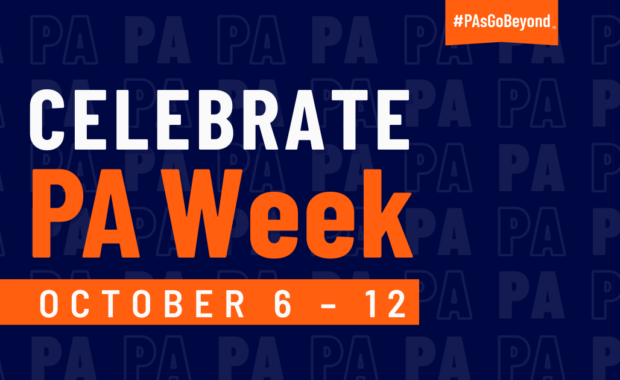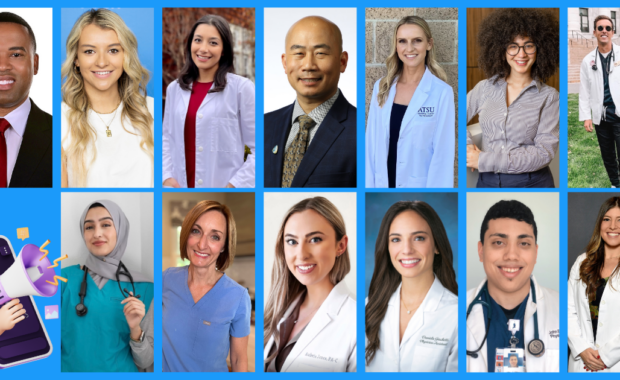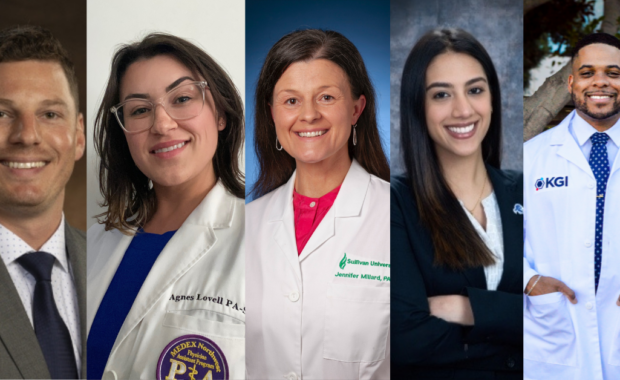PA Student Proves Tenacity, Mental Balance Lead to Paralympic Gold
10-Time Paralympic Medalist Races to Gold While Charging Ahead With PA School
February 12, 2022
By Paulette Bleam, MBA
Raymond Martin, PA-S1 at Baylor College of Medicine, never expected he’d have to balance rigorous training for the Tokyo Paralympics while beginning an intense PA school program. But when COVID-19 delayed the start of the 2020 Paralympic Games, he not only juggled his schoolwork and competed – he came back with the gold.
Martin, 27, is a 3-time Paralympian and 10-time Paralympic medalist, winning seven golds and three silvers. He won four golds in London in 2012; two golds and one silver at the Rio games in 2016; and most recently, won one gold and two silvers in Tokyo 2020 (which were held in 2021 due to the COVID-19 pandemic).
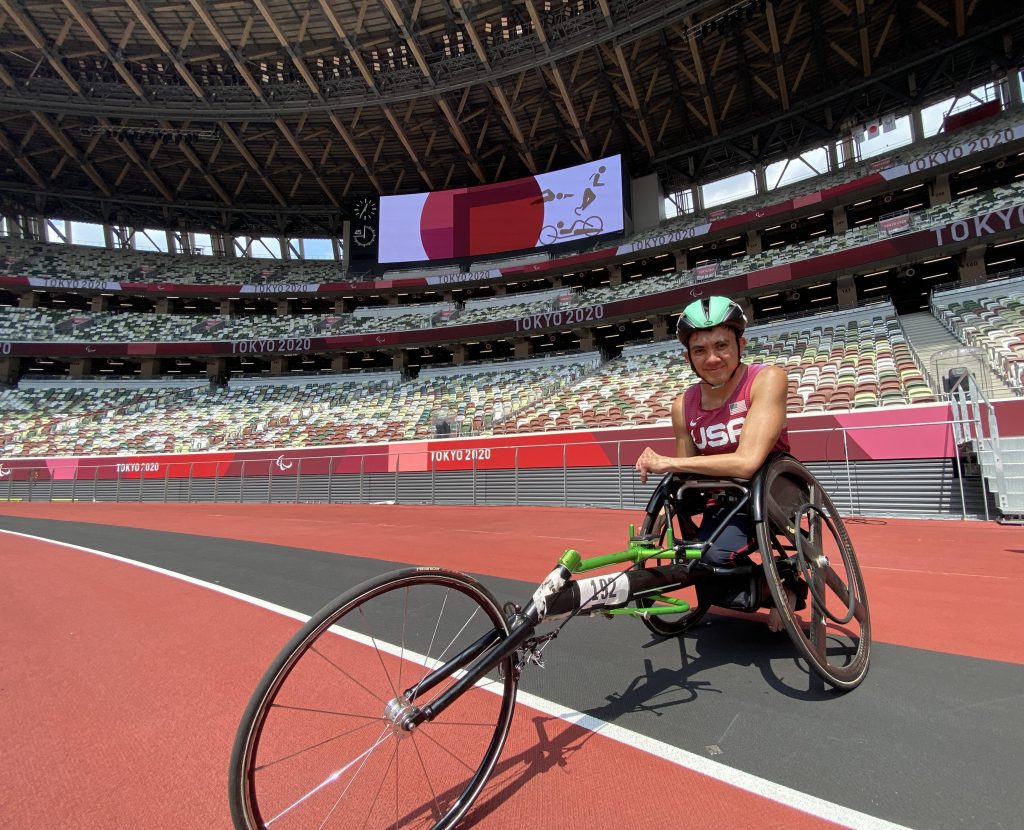
Originally from Jersey City, New Jersey, Martin was born with a rare form of arthrogryposis called Freeman-Sheldon Syndrome, which is a congenital disability that causes contractures, or stiffening, of the joints. He discovered wheelchair racing at a young age while attending a school for children with disabilities after his teacher noticed Martin’s potential.
“I was in gym class and the coach of the racing team was actually the gym teacher and she noticed that I was pretty active and I liked moving around a lot so she asked me if I wanted to try wheelchair racing,” he said. “I did, and 22 years later I’m still going.”
It wasn’t until he was 16 years old at the Junior World Championships in Czech Republic that he realized he could go beyond racing recreationally and compete at a Paralympic level. A teammate on the path for the Paralympics told Martin’s close friend that Martin didn’t have Paralympic potential. When Martin learned of this comment, he said it was the pivotal moment that gave him the motivation to pursue higher levels of competition.
“That really kind of set things in motion for me,” Martin said. “I went back to my coach and I said, ‘Hey, I know London is in two years, but what can we do; how can I get there? I want to be a Paralympian. We changed things up and I made my first games.”
Juggling studies with training
Martin said juggling his studies with training hasn’t always been the easiest road.
He received his bachelor’s degree in kinesiology from University of Illinois, Urbana-Champaign. He missed his first two weeks of undergrad and had to catch up on classwork at the beginning of his college career because he was in London.
“I felt like I was lost, like I was in the middle of an ocean without an oar,” he said.
Martin quickly adapted to juggling classes and training, and PA school was no different. While competing in Tokyo, he missed four exams and several days of lectures.
He applied to PA school during the 2020 cycle with plans to start in 2021, shortly after the 2020 Paralympic Games. But COVID-19 caused the 2020 Paralympic Games to be postponed until 2021. Luckily, he had experience managing schoolwork with training this time.
“Trying to juggle the two is intense, but it’s something that is not new to me, so I’ve kinda learned how to have a balance between the two,” he said.
Martin also found himself having to creatively rearrange his training schedule, going from six to eight training sessions per week, Monday through Friday, and scaling back to one session per day. Previously, his training center in Champaign, Illinois, gave him access to an adaptive gym for weightlifting and a track; but in Houston, Texas, he had to get creative, using indoor training rollers, which he described as spinning drums that act as a treadmill where the back wheels of his chair were removed.
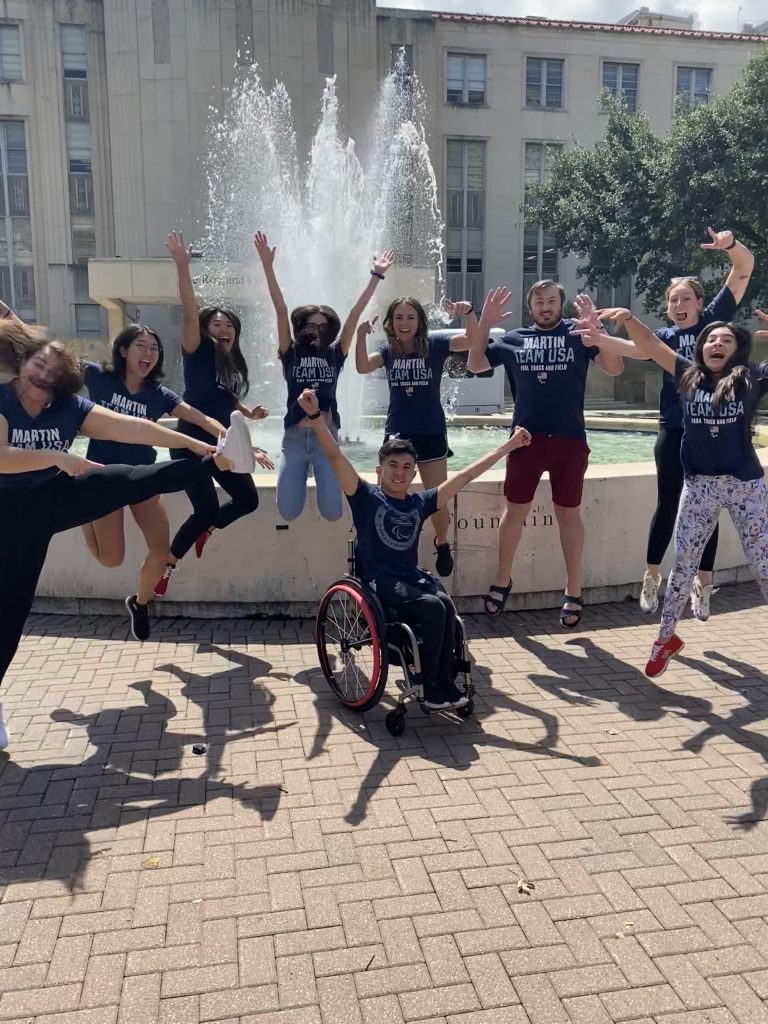
Tokyo during COVID-19 times
Martin said Tokyo was a very different experience from London and Rio. The athletes were restricted to their “bubble,” where they essentially spent their time at the athlete village where they ate or slept, or at the sports venue – and unlike previous Games, they could not explore the area.
He said the biggest difference was due to the lack of spectators allowed at the venue due to the pandemic. He said at his first games in London, there were close to 80,000 spectators and it was sold-out.
“While we still had to get in this elite mindset where you’re at the Paralympic Games, you didn’t have the fans to match it to set the tone,” he said. “So that was a very different experience.”
With that said, he had a cheering section back at home – his classmates created a video wishing him luck in Tokyo.
“My classmates have been amazing,” he said. “I’m really fortunate.”
[Grow your network, find a mentor, and more – join or renew your membership today]
Deciding on PA school
When deciding on a career, Martin knew he wanted to help people but initially didn’t know in which capacity. That all changed during a molecular biology course, where the professor talked about molecular genetics and a condition called progeria, a genetic disorder that is a single base change in a human’s genome that causes someone to experience an entire life span during childhood.
“That was so moving to me and that was what flipped the switch and I knew I wanted to go into medicine,” he said.
It was around that time that he learned about the PA profession. Ever since then, he’s been focused on achieving his goal of becoming a PA and says he couldn’t have picked a better profession.
He said it’s difficult to definitively say which specialty he wants to pursue since his class hasn’t undergone clinical rotations yet. He said his instinct is to lean toward internal medicine inpatient care because he would rather do shift work than work an 8 a.m. to 5 p.m. schedule.
“I like the idea of starting out in internal medicine because that’s really as broad as you can go so you kind of learn as much as you can,” he said. “However, I will say, we’re in our didactic year and we’re learning cardiology right now and I really like it. I really like cardio and the heart and everything about it, so things might be changing. So, we’ll see.”
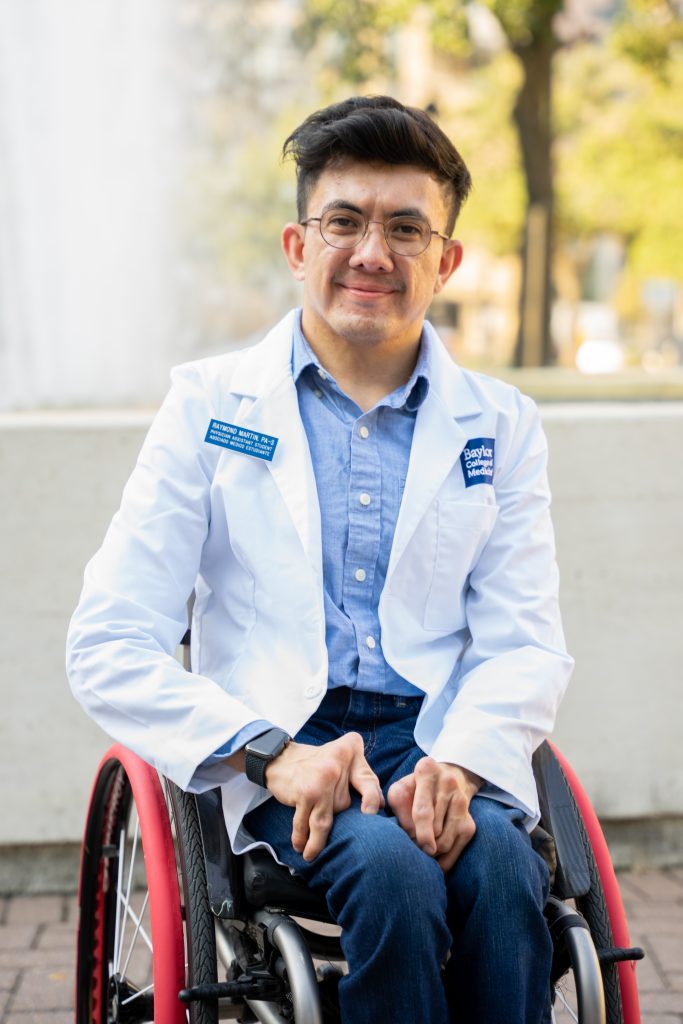
Racing toward the future
Martin said going into the Tokyo Paralympic Games, he was ready to retire, as he felt he had experienced the Paralympics, and was concerned about balancing PA school with training. But once he arrived in Tokyo, he questioned why he ever considered leaving the racetrack.
“As I was in Tokyo going through the experience of the Games, it just reminded me why I got into it and how much I still really liked it. I think it changed my mind a little bit so I might not necessarily fully retire now,” he said. “I should graduate in December of 2023, which is before Paris for the next Paralympics, so hopefully that timing works out.”
Doing anything he sets his mind to
Martin said he attributes most of his success to his parents.
“They’ve been super supportive, and they have always been under the impression that I can do anything that I set my mind to. That’s something they always said when I was growing up and that was enough for me,” he said.
Martin has carried this advice throughout his life, most recently when applying to PA school. To be accepted, he said applicants should show clinical experience, generally in a clinical setting, and he found it nearly impossible to find a job in an entry-level position in healthcare as a person with a visible disability. He applied for nearly 18 months, he would get interviews, and either not get call-backs or they chose other candidates.
“It was really hard staying motivated for that long. I seriously questioned whether or not I could go into PA school and into the PA profession during that time,” he said. “But just remembering what my parents told me that I can do anything that I put my mind to, I just continued on and here I am.”
Bringing more awareness toward caring for patients with disabilities
Martin said he had never heard of the PA profession until he was in undergrad, and he hopes to bring more awareness to the profession.
“I’m honored that I’m able to represent the PA profession,” he said. “The fact that I could represent the PA profession and bring more awareness about the profession, I think is very exciting and I look forward to seeing what I can do with it.”
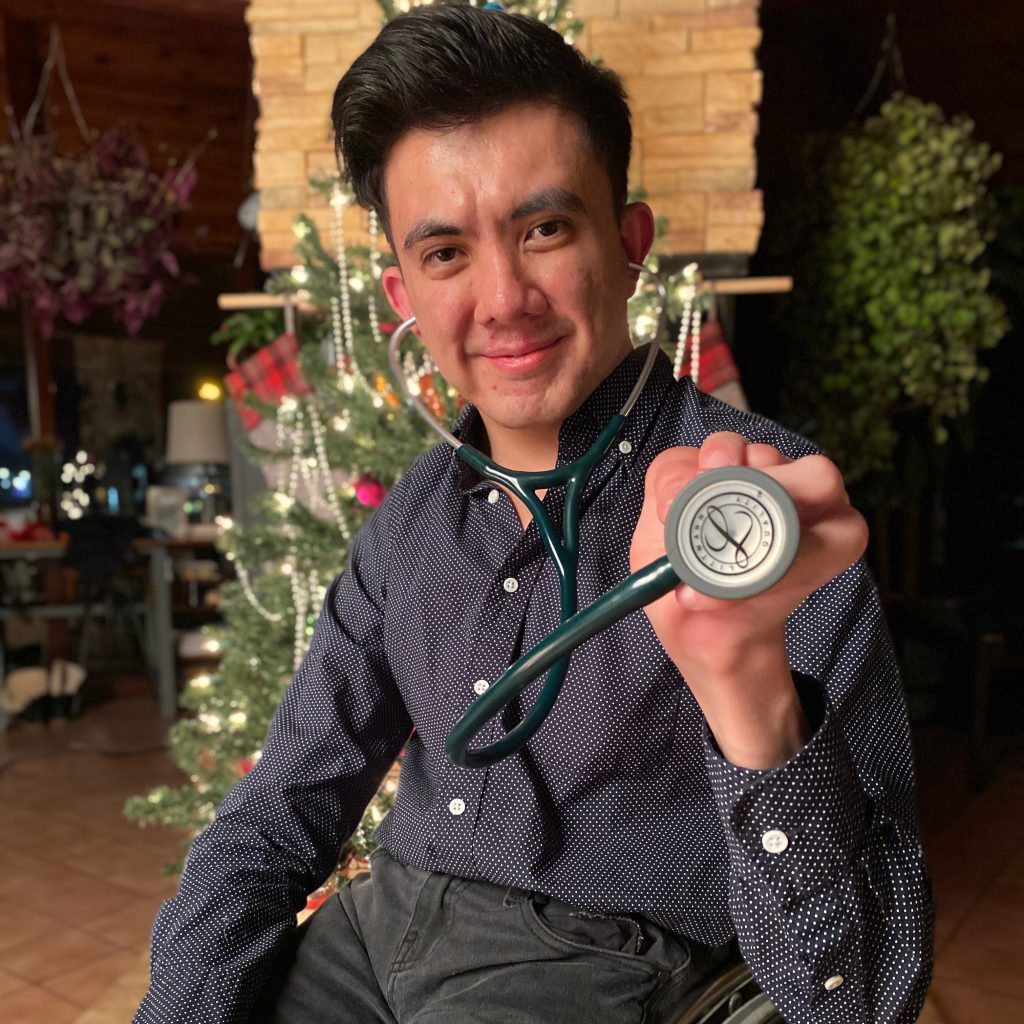
He also wants to bring more awareness to providing care for patients with disabilities and encourage those with disabilities to pursue medicine and the PA profession.
“My experience with the healthcare system thus far in my life has been pretty lackluster,” he said, attributing it to a lack of education for providers about disability. “I highly recommend anyone with a disability who wants to go into medicine to go for it because we need more representation – not just for providers who can help with your colleague’s education but also for patients. If I had a provider with a disability, that would have been great. I would have had a much different healthcare experience as a patient.”
Preventing burnout in PA students
He also wants to bring more attention to burnout among PA students, and in particular, keeping extracurricular interests to help provide balance with the demands of studying.
Martin said given his experience with PA school, he thinks healthcare students have a higher tendency toward burnout. He said PA students can spend all their time studying and it could still not be enough, so it’s important for students to keep their passions for mental health and “staying sane.”
“You have to give yourself grace in terms of being ok with taking care of yourself: going for a walk, getting a haircut, and doing the things that aren’t student things,” he said. “I think keeping up with your passions is a good way to take a brain break and keep you sane.”
This post was originally published on December 3, 2021
You May Also Like
PA Soccer Referee Finds Work-Life Balance
Neurosurgery PA Combines Love of Music, Medicine, and Science
How a Childhood in Bosnia Inspired This PA’s Career
Paulette Bleam, MBA, is AAPA’s senior manager of social media. She can be reached at [email protected].
Thank you for reading AAPA’s News Central
You have 2 articles left this month. Create a free account to read more stories, or become a member for more access to exclusive benefits! Already have an account? Log in.
